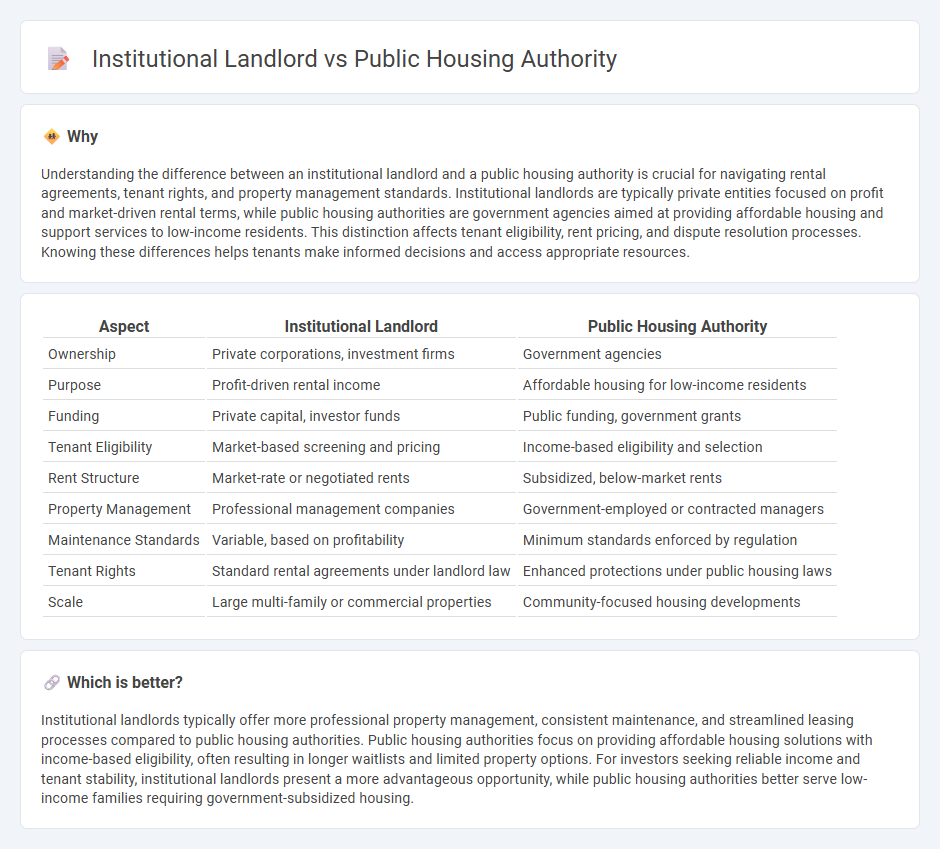
Institutional landlords are private entities managing large-scale rental properties, focusing on maximizing investment returns through professional asset management and market-driven rents. Public housing authorities operate as government agencies providing subsidized housing to low-income families, emphasizing affordability and community support over profitability. Explore the distinctions in ownership, objectives, and tenant services to understand their impact on the housing market.
Why it is important
Understanding the difference between an institutional landlord and a public housing authority is crucial for navigating rental agreements, tenant rights, and property management standards. Institutional landlords are typically private entities focused on profit and market-driven rental terms, while public housing authorities are government agencies aimed at providing affordable housing and support services to low-income residents. This distinction affects tenant eligibility, rent pricing, and dispute resolution processes. Knowing these differences helps tenants make informed decisions and access appropriate resources.
Comparison Table
| Aspect | Institutional Landlord | Public Housing Authority |
|---|---|---|
| Ownership | Private corporations, investment firms | Government agencies |
| Purpose | Profit-driven rental income | Affordable housing for low-income residents |
| Funding | Private capital, investor funds | Public funding, government grants |
| Tenant Eligibility | Market-based screening and pricing | Income-based eligibility and selection |
| Rent Structure | Market-rate or negotiated rents | Subsidized, below-market rents |
| Property Management | Professional management companies | Government-employed or contracted managers |
| Maintenance Standards | Variable, based on profitability | Minimum standards enforced by regulation |
| Tenant Rights | Standard rental agreements under landlord law | Enhanced protections under public housing laws |
| Scale | Large multi-family or commercial properties | Community-focused housing developments |
Which is better?
Institutional landlords typically offer more professional property management, consistent maintenance, and streamlined leasing processes compared to public housing authorities. Public housing authorities focus on providing affordable housing solutions with income-based eligibility, often resulting in longer waitlists and limited property options. For investors seeking reliable income and tenant stability, institutional landlords present a more advantageous opportunity, while public housing authorities better serve low-income families requiring government-subsidized housing.
Connection
Institutional landlords and public housing authorities are connected through their shared role in managing large-scale residential properties to provide affordable housing solutions. Institutional landlords often collaborate with public housing authorities to develop, finance, and operate mixed-income housing projects that integrate private investment with government subsidies. This partnership optimizes resource allocation and enhances community development by combining institutional capital with public housing mandates.
Key Terms
Affordable Housing
Public housing authorities manage government-subsidized housing units to ensure affordability for low-income families, focusing on long-term public welfare and community development. Institutional landlords, such as private real estate investment firms, acquire and operate affordable housing projects with an emphasis on financial returns and large-scale property management. Explore the distinct roles and impacts of these entities in addressing affordable housing challenges.
Property Management
Public housing authorities manage government-subsidized residential properties, focusing on affordable housing, compliance with federal regulations, and tenant eligibility verification. Institutional landlords operate large portfolios of private rental properties, prioritizing asset value maximization, professional property maintenance, and tenant satisfaction to ensure steady revenue streams. Explore detailed strategies and operational differences between these two property management models to enhance your understanding.
Tenant Eligibility
Public housing authorities primarily serve low-income families, elderly, and disabled individuals by providing subsidized rental housing through strict eligibility criteria based on income limits set by HUD. Institutional landlords, such as real estate investment trusts or private equity firms, typically have broader tenant eligibility policies focusing on creditworthiness, income level, and rental history without government-imposed restrictions. Explore more to understand how these eligibility requirements impact tenant access and housing stability.
Source and External Links
Public Housing | USAGov - Provides information on public housing eligibility, application processes, and how to find local housing authorities.
PHA Contact Information | HUD.gov - Lists contact details for local Public Housing Agencies across the U.S. to assist with housing programs.
Hawaii Public Housing Authority - Manages federal and state public housing programs in Hawaii to provide affordable housing for families.
 dowidth.com
dowidth.com